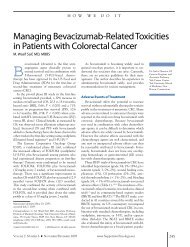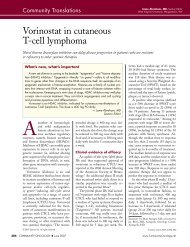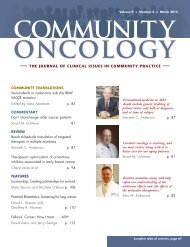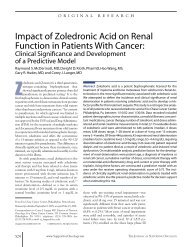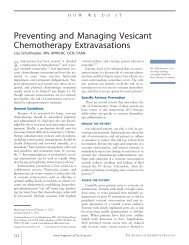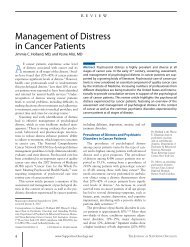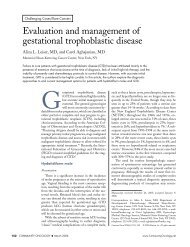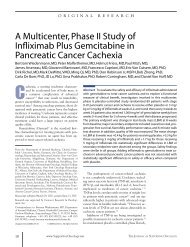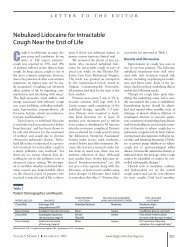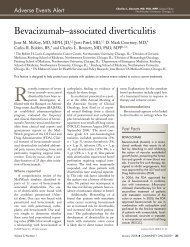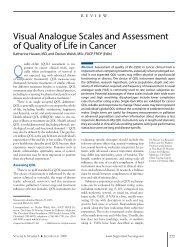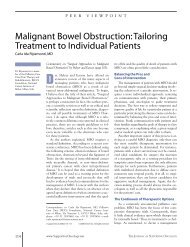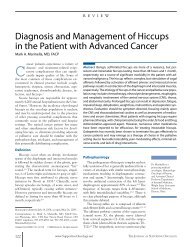Diagnosis and Management of Oral Mucositis
Diagnosis and Management of Oral Mucositis
Diagnosis and Management of Oral Mucositis
Create successful ePaper yourself
Turn your PDF publications into a flip-book with our unique Google optimized e-Paper software.
Table 2<br />
Updated Guidelines for <strong>Management</strong> <strong>of</strong> <strong>Oral</strong> <strong>Mucositis</strong><br />
CLINICAL PRACTICE<br />
steps in these pathways, thus enhancing their<br />
effectiveness. Since some agents act to downregulate<br />
NF-κB activation, which is involved in<br />
upregulating numerous genes encoding proinflammatory<br />
cytokines, the resulting inhibition<br />
may be greatly enhanced.<br />
<strong>Diagnosis</strong><br />
RECOMMENDATIONS<br />
Pain management • Regular oral pain assessment using validated selfassessment<br />
instruments<br />
• Topical anesthetics, other agents as needed<br />
<strong>Oral</strong> assessment <strong>and</strong> • Regular assessment using validated instruments<br />
oral care • Preventive <strong>and</strong> therapeutic oral care regimens<br />
• Routine, systematic oral hygiene<br />
• Interdisciplinary approach to oral care<br />
Dental care • Dental evaluation <strong>and</strong> treatment prior to initiating<br />
anticancer therapy (hygiene, teeth, periodontal)<br />
• Inclusion <strong>of</strong> dental pr<strong>of</strong>essionals as an integral part <strong>of</strong><br />
the interdisciplinary healthcare team<br />
General • Education <strong>of</strong> staff, patients, <strong>and</strong> families to ensure<br />
adherence to good oral care<br />
• Outcome assessment to improve quality <strong>of</strong> care<br />
Based on guidelines issued by the Basic <strong>Oral</strong> Care Group <strong>of</strong> the Multinational Association <strong>of</strong> Supportive Care in<br />
Cancer <strong>and</strong> International Society for <strong>Oral</strong> Oncology (MASCC/ISOO)<br />
Adapted from McGuire et al 17<br />
<strong>Diagnosis</strong> <strong>and</strong><br />
<strong>Management</strong> <strong>of</strong><br />
<strong>Oral</strong> <strong>Mucositis</strong><br />
<strong>Oral</strong> mucositis is typically diagnosed based on<br />
the clinical appearance, location, timing <strong>of</strong> oral lesions,<br />
<strong>and</strong> use <strong>of</strong> certain types <strong>of</strong> therapy known<br />
to be associated with mucositis. For example, stomatotoxic<br />
chemotherapeutics generally result in<br />
lesions on the unkeratinized movable mucosa, with<br />
less frequent involvement <strong>of</strong> the keratinized hard<br />
palate, dorsal surface <strong>of</strong> the tongue, or gingiva. 10<br />
Radiation therapy can also induce mucositis in a<br />
similar fashion. Representative examples <strong>of</strong> the appearance<br />
<strong>of</strong> oral mucositis are shown in Figure 1.<br />
Other common conditions can have a similar<br />
clinical presentation to oral mucositis <strong>and</strong> may<br />
confuse the differential diagnosis. They include<br />
oral c<strong>and</strong>idiasis (thrush), herpes simplex virus<br />
(HSV), <strong>and</strong> graft-versus-host disease (GVHD)<br />
in transplant patients (Figure 2). C<strong>and</strong>idal overgrowth<br />
(c<strong>and</strong>idiasis), which occurs in response to<br />
radiation therapy <strong>and</strong>/or chemotherapy, usually<br />
responds well to systemic antifungal medication.<br />
HSV is frequently seen in immunocompromised<br />
cancer patients receiving chemotherapy, 11 with<br />
lesions appearing on the lips (cold sores) or intraoral<br />
mucosa. 12 Initiation <strong>of</strong> antiviral therapy<br />
may ameliorate HSV-associated stomatitis <strong>and</strong><br />
reduce symptoms. <strong>Oral</strong> mucositis can also occur<br />
in patients receiving myeloablative conditioning<br />
regimens for allogeneic hematopoietic SCT <strong>and</strong> in<br />
those with GVHD, affecting the oral mucosa <strong>and</strong><br />
gingiva. 13 Consequently, accurate diagnosis <strong>of</strong> oral<br />
mucositis is critical to ensure selection <strong>and</strong> timely<br />
initiation <strong>of</strong> optimal therapy.<br />
Several scoring systems have been devised to<br />
assess the severity <strong>of</strong> oral mucositis <strong>and</strong> its treatment,<br />
but no one scale is uniformly employed. The<br />
two most common scales are those proposed by<br />
the World Health Organization (WHO) <strong>and</strong> the<br />
National Cancer Institute Common Toxicity Criteria<br />
(NCI–CTC). 10 Low grades (1 <strong>and</strong> 2) indicate<br />
a condition that allows dietary intake, whereas the<br />
more severe grades (3 <strong>and</strong> 4) limit or completely<br />
preclude the intake <strong>of</strong> solid food. In addition, Sonis<br />
et al 14 have devised an <strong>Oral</strong> <strong>Mucositis</strong> Assessment<br />
Scale (OMAS), which is more quantitative<br />
for clinical research but may be difficult to use in<br />
routine clinical care. Other scoring systems have<br />
been proposed, 15 but the lack <strong>of</strong> st<strong>and</strong>ardization<br />
has hampered their acceptance.<br />
Treatment<br />
TREATMENT GUIDELINES<br />
Treatment guidelines for oral mucositis were<br />
issued in 2004 16 <strong>and</strong> recently were updated by the<br />
Multinational Association <strong>of</strong> Supportive Care in<br />
Cancer <strong>and</strong> International Society for <strong>Oral</strong> Oncology<br />
(MASCC/ISOO). 17 Guidelines issued by the<br />
Basic <strong>Oral</strong> Care Group subcommittee reviewed<br />
32 relevant studies published in the literature between<br />
2000 <strong>and</strong> 2005. Discussions by the panel<br />
resulted in the development <strong>of</strong> a set <strong>of</strong> recommendations<br />
on the prevention <strong>and</strong> treatment <strong>of</strong> oral<br />
mucositis (Table 2).<br />
These guidelines emphasize basic oral care,<br />
an interdisciplinary approach to oral care, routine<br />
assessment <strong>of</strong> oral care <strong>and</strong> pain management<br />
using validated instruments, <strong>and</strong> regular<br />
dental assessment <strong>and</strong> dental care prior to the<br />
start <strong>of</strong> cancer therapy. Any irritants to the oral<br />
mucosa (eg, spicy foods or alcohol) should be<br />
avoided. The panel stressed the need for education<br />
<strong>of</strong> staff as well as patients <strong>and</strong> their families<br />
on proper oral care <strong>and</strong> the importance <strong>of</strong><br />
outcome assessment using quality-improvement<br />
processes.<br />
Currently, there is insufficient high-level<br />
16 www.SupportiveOncology.net THE JOURNAL OF SUPPORTIVE ONCOLOGY



